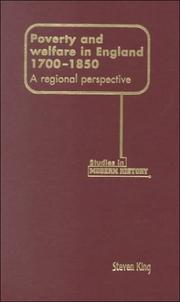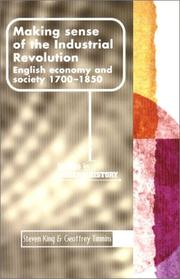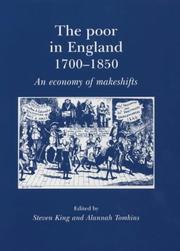| Listing 1 - 10 of 30 | << page >> |
Sort by
|

ISBN: 0719049393 0719049407 Year: 2000 Publisher: Manchester Manchester University Press
Abstract | Keywords | Export | Availability | Bookmark
 Loading...
Loading...Choose an application
- Reference Manager
- EndNote
- RefWorks (Direct export to RefWorks)
History of the United Kingdom and Ireland --- anno 1700-1799 --- anno 1800-1899 --- Poverty --- Public welfare --- History.
Book
ISBN: 9780773556492 0773556494 9780773556485 0773556486 9780773556508 0773556508 9780773556515 0773556516 Year: 2019 Publisher: Montreal Kingston London Chicago McGill-Queen's University Press
Abstract | Keywords | Export | Availability | Bookmark
 Loading...
Loading...Choose an application
- Reference Manager
- EndNote
- RefWorks (Direct export to RefWorks)
From the mid-eighteenth century to the early nineteenth century, the English Old Poor Law was waning, soon to be replaced by the New Poor Law and its dreaded workhouses. In Writing the Lives of the English Poor, 1750s-1830s Steven King reveals colourful stories of poor people, their advocates, and the officials with whom they engaged during this period in British history, distilled from the largest collection of parochial correspondence ever assembled. Investigating the way that people experienced and shaped the English and Welsh welfare system through the use of almost 26,000 pauper letters and the correspondence of overseers in forty-eight counties, Writing the Lives of the English Poor, 1750s-1830s reconstructs the process by which the poor claimed, extended, or defended their parochial allowances. Challenging preconceptions about literacy, power, social structure, and the agency of ordinary people, these stories suggest that advocates, officials, and the poor shared a common linguistic register and an understanding of how far welfare decisions could be contested and negotiated. King shifts attention away from traditional approaches to construct an unprecedented, comprehensive portrait of poor law administration and popular writing at the turn of the nineteenth century. At a time when the western European welfare model is under sustained threat, Writing the Lives of the English Poor, 1750s-1830s takes us back to its deepest roots to demonstrate that the signature of a strong welfare system is malleability.
Poor --- Disadvantaged, Economically --- Economically disadvantaged --- Impoverished people --- Low-income people --- Pauperism --- Poor, The --- Poor people --- Persons --- Social classes --- Poverty --- History --- Economic conditions
Book
ISBN: 1526138859 1526129019 9781526129017 9781526129024 1526129027 1526129000 9781526129000 Year: 2018 Publisher: Manchester Manchester University Press
Abstract | Keywords | Export | Availability | Bookmark
 Loading...
Loading...Choose an application
- Reference Manager
- EndNote
- RefWorks (Direct export to RefWorks)
This work explores the medical world of the poor and the Old Poor Law in the period 1750-1834.
Poor --- Disadvantaged, Economically --- Economically disadvantaged --- Impoverished people --- Low-income people --- Pauperism --- Poor, The --- Poor people --- Persons --- Social classes --- Poverty --- Medical care --- History --- Economic conditions --- England --- Social conditions --- Medical care&delete& --- History&delete& --- Health Services --- Social Welfare --- Social Conditions --- History, 18th Century. --- History, 19th Century. --- history. --- England. --- 19th Cent. History (Medicine) --- 19th Cent. History of Medicine --- 19th Cent. Medicine --- Historical Events, 19th Century --- History of Medicine, 19th Cent. --- History, Nineteenth Century --- Medical History, 19th Cent. --- Medicine, 19th Cent. --- 19th Century History --- 19th Cent. Histories (Medicine) --- 19th Century Histories --- Cent. Histories, 19th (Medicine) --- Cent. History, 19th (Medicine) --- Century Histories, 19th --- Century Histories, Nineteenth --- Century History, 19th --- Century History, Nineteenth --- Histories, 19th Cent. (Medicine) --- Histories, 19th Century --- Histories, Nineteenth Century --- History, 19th Cent. (Medicine) --- Nineteenth Century Histories --- Nineteenth Century History --- 18th Cent. History (Medicine) --- 18th Cent. History of Medicine --- 18th Cent. Medicine --- Historical Events, 18th Century --- History of Medicine, 18th Cent. --- History, Eighteenth Century --- Medical History, 18th Cent. --- Medicine, 18th Cent. --- 18th Century History --- 18th Century Histories --- Cent. History, 18th (Medicine) --- Cent. Medicine, 18th --- Century Histories, 18th --- Century Histories, Eighteenth --- Century History, 18th --- Century History, Eighteenth --- Eighteenth Century Histories --- Eighteenth Century History --- Histories, 18th Century --- Histories, Eighteenth Century --- History, 18th Cent. (Medicine) --- Humanities. --- History. --- Social and cultural history. --- MEDICAL / History. --- No poverty. --- ill-health. --- medical welfare. --- paternalism. --- poor law.
Book
ISBN: 9781845194338 Year: 2016 Publisher: Brighton : Sussex Academic,
Abstract | Keywords | Export | Availability | Bookmark
 Loading...
Loading...Choose an application
- Reference Manager
- EndNote
- RefWorks (Direct export to RefWorks)
Poor --- Poverty --- Public welfare --- Poor. --- Poverty. --- Public welfare. --- History. --- England.
Book
ISBN: 9781782381457 9781782381464 1782381465 9781461952510 1461952514 1782381457 Year: 2013 Volume: 23 Publisher: New York Berghahn
Abstract | Keywords | Export | Availability | Bookmark
 Loading...
Loading...Choose an application
- Reference Manager
- EndNote
- RefWorks (Direct export to RefWorks)
History of Europe --- anno 1500-1799 --- anno 1800-1999 --- Emigration and immigration --- Immigrants --- Assimilation (Sociology) --- Identity (Psychology) --- Social aspects --- History. --- Europe --- History --- Emigrants --- Foreign-born population --- Foreign population --- Foreigners --- Migrants --- Persons --- Aliens --- Personal identity --- Personality --- Self --- Ego (Psychology) --- Individuality --- Immigration --- International migration --- Migration, International --- Population geography --- Colonization --- Cultural assimilation --- Anthropology --- Socialization --- Acculturation --- Cultural fusion --- Minorities --- Council of Europe countries --- Eastern Hemisphere --- Eurasia

ISBN: 0719050227 0719050219 9780719050220 9780719050213 Year: 2001 Publisher: Manchester Manchester University Press
Abstract | Keywords | Export | Availability | Bookmark
 Loading...
Loading...Choose an application
- Reference Manager
- EndNote
- RefWorks (Direct export to RefWorks)
History of the United Kingdom and Ireland --- anno 1700-1799 --- anno 1800-1899 --- Industrial revolution --- -Revolution, Industrial --- Economic history --- Social history --- Great Britain --- Economic conditions --- -Industrial revolution --- -Great Britain --- -History of the United Kingdom and Ireland --- Industrial revolution - Great Britain.
Book
ISBN: 9783039101764 3039101765 Year: 2007 Publisher: Bern ; Oxford : Peter Lang,
Abstract | Keywords | Export | Availability | Bookmark
 Loading...
Loading...Choose an application
- Reference Manager
- EndNote
- RefWorks (Direct export to RefWorks)
Public welfare --- Etat providence --- Aide sociale --- History --- Histoire --- Protection sociale --- Pays européens --- Pays-Bas --- Norvège --- Danemark --- Irlande --- Finlande --- Ecosse
Book
ISSN: 2191558X ISBN: 1283908840 1461455596 1461455588 Year: 2013 Publisher: New York : Springer,
Abstract | Keywords | Export | Availability | Bookmark
 Loading...
Loading...Choose an application
- Reference Manager
- EndNote
- RefWorks (Direct export to RefWorks)
While steroids from the periphery have profound effects on the nervous system, the nervous system also produces its own steroids de novo (“neurosteroids”). The physiological importance of neurosteroids is beginning to be understood. These steroids potentially have roles in sedative/hypnotic behavior, anxiety, learning, and memory. At the cellular level, neurosteroids affect neuronal excitability, synaptic plasticity and cell proliferation and survival. Early findings hold promise for future strategies to treat specific psychologicalconditions and neurological diseases. This Brief will focus on the current state of understanding of brainderived neurosteroids.
Neuroendocrinology. --- Steroid hormones. --- Neurohormones. --- Hormonal steroids --- Neuroendocrinology --- Neurohormones --- Medicine. --- Neurosciences. --- Neurochemistry. --- Biomedicine. --- Biochemistry --- Neurosciences --- Neural sciences --- Neurological sciences --- Neuroscience --- Medical sciences --- Nervous system --- Clinical sciences --- Medical profession --- Human biology --- Life sciences --- Pathology --- Physicians --- Hormones --- Steroids --- Endocrinology --- Neurology

ISBN: 0719061598 0719080436 9786610734139 1847790666 1280734132 1423706382 9781423706380 9781847790668 9780719061592 9781280734137 9781526137869 1526137860 Year: 2003 Publisher: Manchester, U.K. ; New York : Manchester University Press,
Abstract | Keywords | Export | Availability | Bookmark
 Loading...
Loading...Choose an application
- Reference Manager
- EndNote
- RefWorks (Direct export to RefWorks)
This fascinating study investigates the experience of English poverty between 1700 and 1900 and in the ways in which the poor made ends meet. The phrase 'economy of makeshifts' has often been used to summarise the patchy, desperate and sometimes failing
History of the United Kingdom and Ireland --- anno 1700-1799 --- anno 1800-1899 --- Charity --- Income --- Poor --- Public welfare --- Social networks --- History. --- Networking, Social --- Networks, Social --- Social networking --- Social support systems --- Support systems, Social --- Interpersonal relations --- Cliques (Sociology) --- Microblogs --- Benevolent institutions --- Poor relief --- Public assistance --- Public charities --- Public relief --- Public welfare reform --- Relief (Aid) --- Social welfare --- Welfare (Public assistance) --- Welfare reform --- Human services --- Social service --- Disadvantaged, Economically --- Economically disadvantaged --- Impoverished people --- Low-income people --- Pauperism --- Poor, The --- Poor people --- Persons --- Social classes --- Poverty --- Family income --- Fortunes --- Household income --- Personal income --- Economics --- Finance --- Property --- Wealth --- Gross national product --- Profit --- Purchasing power --- Alms and almsgiving --- Conduct of life --- Government policy --- Economic conditions
Book
ISBN: 3030478394 3030478386 Year: 2020 Publisher: Cham : Springer International Publishing : Imprint: Palgrave Macmillan,
Abstract | Keywords | Export | Availability | Bookmark
 Loading...
Loading...Choose an application
- Reference Manager
- EndNote
- RefWorks (Direct export to RefWorks)
This book represents the first attempt to identify and describe a workhouse reform ‘movement’ in mid- to late-nineteenth-century England, beyond the obvious candidates of the Workhouse Visiting Society and the voices of popular critics such as Charles Dickens and Florence Nightingale. It is a subject on which the existing workhouse literature is largely silent, and this book therefore fills a considerable gap in our understanding of contemporary attitudes towards institutional welfare. Although many scholars have touched on the more obvious strands of workhouse criticism noted above, few have gone beyond these to explore the possibility that a concerted ‘movement’ existed that sought to place pressure on those with responsibility for workhouse administration, and to influence the trajectory of workhouse policy.
Workhouses --- Penal institutions --- Correctional institutions --- Prisons --- History. --- Great Britain—History. --- Social history. --- Civilization—History. --- History of Britain and Ireland. --- Social History. --- Cultural History. --- Descriptive sociology --- Social conditions --- Social history --- History --- Sociology --- Civilization --- Great Britain --- Cultural history --- England
| Listing 1 - 10 of 30 | << page >> |
Sort by
|

 Search
Search Feedback
Feedback About UniCat
About UniCat  Help
Help News
News